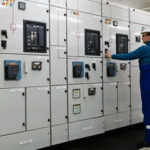Electricity powers our homes, businesses, and industries, making accurate measurement of energy consumption essential for both consumers and utility providers. Over the years, energy metering technology has evolved significantly. The shift from traditional analog meters to modern digital electric meters has transformed the way we monitor and manage energy use. At Microtech Group Of Companies, we are at the forefront of this transformation, providing advanced meter solutions that bring accuracy, efficiency, cost-effectiveness, and enhanced safety to your energy management needs. But what exactly sets digital electric meters apart from their analog predecessors? Let’s explore the differences, advantages, and why choosing expert solutions from Microtech Group Of Companies is a smart investment.
Understanding Analog Meters: The Traditional Approach
Traditional analog electric meters, sometimes called electromechanical meters, have been the backbone of energy measurement for decades. These meters work using a spinning aluminum disc driven by electromagnetic induction. As electricity flows through the meter, the disc rotates at a rate proportional to energy consumption. The number of rotations is translated into kilowatt-hours (kWh) and displayed on a series of dials.
While analog meters have served reliably over the years, they have several limitations:
- Manual Reading: Utility personnel must physically visit each meter to record readings, which is time-consuming and prone to human error.
- Limited Data: Analog meters provide only cumulative usage data, with no real-time monitoring or detailed breakdowns.
- Susceptibility to Tampering: Their mechanical nature can make them more vulnerable to tampering or manipulation.
- Wear and Tear: Moving parts are subject to aging and mechanical failure, which can affect accuracy over time.
The Rise of Digital Electric Meters
Digital electric meters, also known as electronic or smart meters, represent a leap forward in energy measurement technology. These devices use electronic sensors and microprocessors to record and display energy consumption digitally. Many digital meters are also equipped with communication modules for remote data transmission, enabling advanced features that analog meters simply cannot offer.
Key Features of Digital Meters:
- Digital Display: Easy-to-read LCD or LED screens show precise readings.
- Real-Time Data: Instantaneous monitoring of energy usage.
- Remote Communication: Data can be sent automatically to utility companies, eliminating the need for manual readings.
- Advanced Analytics: Support for time-of-use rates, peak demand analysis, and more.
- Enhanced Security: Built-in tamper detection and secure data transmission.
Digital vs. Analog: A Detailed Comparison
Let’s dive deeper into how digital electric meters differ from traditional analog meters across critical aspects:
1. Accuracy and Reliability
- Analog Meters: Rely on mechanical components, which can degrade, leading to inaccurate readings over time. Factors like dust, humidity, and physical shocks can affect performance.
- Digital Meters: Use solid-state electronics, offering higher precision and consistency. They automatically calibrate and maintain accuracy throughout their lifespan.
2. Data Collection and Monitoring
- Analog Meters: Only provide total cumulative consumption, with no breakdown of usage patterns or time-of-use data.
- Digital Meters: Track and store detailed usage data, including hourly, daily, or even minute-by-minute consumption. This allows users to identify patterns and adjust usage for greater efficiency.
3. Reading and Billing
- Analog Meters: Require manual reading, which can lead to delays and human errors. Estimated billing is common if readings are missed.
- Digital Meters: Enable automatic, remote readings, ensuring timely and accurate billing. No more estimated bills – you pay for what you actually use.
4. Security and Tamper Resistance
- Analog Meters: More susceptible to tampering, such as magnet manipulation or unauthorized access.
- Digital Meters: Feature tamper alarms, encrypted data, and secure enclosures, making fraudulent activities much harder.
5. Maintenance and Longevity
- Analog Meters: Moving parts wear out over time, leading to potential breakdowns and the need for replacement.
- Digital Meters: Minimal moving parts, resulting in lower maintenance and longer operational life.
6. User Experience
- Analog Meters: Difficult to read and interpret, requiring expertise to understand dial positions.
- Digital Meters: User-friendly display, often with additional information such as voltage, current, and power factor.
Best Services from Microtech Group Of Companies
At Microtech Group Of Companies, we don’t just supply meters – we deliver comprehensive energy solutions tailored to your needs. Our services include:
- Professional Consultation: We assess your current metering setup and recommend the optimal digital solution for your property or business.
- Expert Installation: Our skilled technicians ensure a seamless transition from analog to digital meters, minimizing downtime and disruption.
- System Integration: We integrate meters with your building management or automation systems for enhanced energy control.
- Training and Support: Our team provides training so you can make the most of your new digital meters and understand your energy data.
- Ongoing Maintenance: We offer regular maintenance and calibration services to keep your meters operating at peak performance.
Cost Benefits of Digital Electric Meters
Investing in digital electric meters with Microtech Group Of Companies offers substantial cost advantages:
- Elimination of Estimated Bills: Accurate, real-time readings mean you’re billed only for what you use, avoiding overcharges or disputes.
- Lower Operational Costs: No need for manual meter readings reduces labor costs for utilities and property managers.
- Early Detection of Issues: Real-time monitoring helps spot abnormal usage or leaks, enabling prompt action and cost savings.
- Long-Term Durability: Digital meters require less frequent replacement and maintenance, lowering the total cost of ownership.
Safety Enhancements
Safety is always our top concern at Microtech Group Of Companies. Digital meters provide:
- Remote Access: Less need for personnel to physically enter potentially hazardous locations.
- Overload and Fault Detection: Many digital meters can identify overloads or electrical faults, preventing potential fire hazards.
- Tamper Alerts: Immediate notification of unauthorized access or tampering attempts to ensure system integrity.
- Data Security: Encrypted data transmission protects your usage data from unauthorized access or cyber threats.
Why Choose Microtech Group Of Companies?
- Experience and Expertise: Years of industry expertise and a track record of successful installations.
- Advanced Technology: We supply and install the latest digital metering solutions tailored to your needs.
- Customer-Centric Approach: From consultation to post-installation support, we prioritize your satisfaction.
- Comprehensive Services: We handle everything, so you enjoy hassle-free, reliable energy monitoring.
Conclusion
The transition from analog to digital electric meters marks a significant advancement in how we measure and manage electricity. Digital meters offer superior accuracy, convenience, cost savings, and safety, making them the clear choice for modern energy management. Microtech Group Of Companies is dedicated to guiding you through this transition with best-in-class products and services. Upgrade your energy monitoring system today and experience the difference that digital technology – and expert support – can make.
Contact Microtech Group Of Companies to learn how our digital metering solutions can benefit your home or business.

